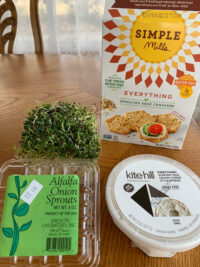Spectacular Sprouts
With the news about contaminated romance lettuce I sense the worry some people have about giving up one of their main salad ingredients. One of my health coaching clients asked me: “So what are we supposed to do?”. I am trying to uncover some options below.
Off course, you can try a different kind of lettuce, like red lettuce or maybe some greens, like arugula and spinach, but how about a different alternative? Have you considered sprouts? They are packed full of vitamins and they have that distinct crunchy and refreshing taste. They make a great lettuce replacement for sandwiches and an excellent salad topping.
I like to try different kinds, the other day I chose the Alfalfa Onion one, and paired it with some almond cream spread and gluten free crackers. It was delicious (check out the picture)! My kids also like this stuff, we sometimes get silly and pretend we are goats. What’s better yet? It’s grown locally, it’s fresh and in my opinion it has less chance of contamination*. It travels a short distance to the shelves. It actually has a short life time span, so maybe that’s why we do not rely on California to give us our local sprouts.
So, have I convinced you to try some sprouts? If yes, drop me a note and tell me your favorite variety. As always, if you want to get more information or need to get some clarity on ways to improve your wellness, do not hesitate to reach out to me!
* This is an article from Dr Mercola‘s website, explaining possible reasons for contamination, I am not the right expert to weigh in here, but I thought I would share this with you.
“While authorities claim it’s still unclear how the romaine lettuce in Salinas Valley got contaminated, the unique strain of E. coli that has now made an appearance three years in a row — E. coli O157:H7, also known as STEC — is typically associated with ruminant animals, and cattle in particular. Generally, symptoms appear one to 10 days after eating the contaminated food and may include bloody diarrhea, stomach cramps and vomiting. The first of the two outbreaks in 2018 was eventually traced back to a concentrated animal feeding operation (CAFO) in the vicinity of the Yuma, AZ, lettuce farm. Runoff from its manure lagoons is thought to have entered and contaminated a nearby canal, and this E. coli-tainted water was then used for irrigation on the lettuce fields. This could very well be what Salinas Valley farmers are dealing with as well.”

